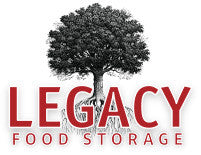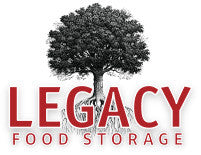
You Might Change Your Mind About Emergency Planning
The media has long shaped public perception of preparedness by promoting a stereotypical image of preppers, sensationalizing them as conspiracy theorists or extremists driven by paranoia, all for the sake of attracting clicks and views.
True reality is not that extreme. There are various levels of readiness that range from basic supplies to comprehensive self-sufficiency. Emergency preparedness is fundamentally about protecting what matters most, your family's safety and well-being. Some people keep a few extra batteries and water bottles. Others develop entire systems to weather any storm. Here are some brief examples of different levels of preparation you might see:
Baseline Ready: This group might have basics like some extra pantry food, flashlights, radios, batteries, basic first aid supplies, and other essentials.
Confident Ready: A step up from the basics, this group might add water storage and filtration, solar lights, longer-term food storage, and non-electric tools for cooking and other tasks. This group wants to be more comfortable than just the basics.
Expert Ready: Experts plan for self-sufficiency on many levels, avoiding reliance on others during crises, and they absolutely do not want to stand in any lines. This group plans carefully for comfortable living, include security in their prepping, and often know valuable skills like gardening, raising livestock, first aid, and many other developed skills. Homesteading mindset comes close to this level but there are many experts in suburban areas with similar plans, skills and solutions ready, but only if needed.
Wisdom Born: This group has learned from personal experience. Having faced a past emergency unprepared, they commit to never being caught off guard again and obtain ample supplies for the future.
Most of us fall somewhere between these levels. Preparedness isn't about extreme measures, but about understanding that the systems we take for granted can fail. Emergencies happen without warning, and modern conveniences aren't guaranteed.
Here are two examples of emergencies and how even some simple preparedness can make a significant difference can help.
Evening surprise
It was 9:00 pm, and all was settling down in the household on a normal Tuesday evening. Mom put the 7-year-old twins to bed and snuggled into her own bed to finish the final chapter of her book. Dad was in the office watching the last half of the game he missed earlier but soon, called it a night.
At 12:30 am, everything changed. Fire alarms shattered the silence. Thick smoke was sneaking under the bedroom doors, and the smell was unmistakable. This was not a drill.
Quickly putting his shoes on he kept by the bed, Dad felt the door while Mom slipped her own shoes on and pulled out the two emergency bags from under the bed along with the keys, wallet, and purse. The door was not hot, so it was safe to open. They could still see down the hallway to the boys' room, but the boys must not be awake. They can sleep through anything. The fire was clearly downstairs in the kitchen, but the smoke was getting dangerous.
Mom immediately called 911 while Dad woke the boys, put their shoes on, and grabbed their fire escape bags under their beds. Peeking over the banister, in this short amount of time, the fire had reached the stairway, and leaving the house through the front door was no longer an option. Dad opened the window in the boys' room, pulled out the fire ladder from the closet, and put it in place while they all climbed down safely to the ground.
By the time they were under the big oak in front, the agreed-upon meeting place, the fire trucks had arrived. The fire hadn’t reached the garage, and they were safely able to back the cars out. As the fire crew worked, it became clear they were not getting back into the home tonight. Mom took the boys to the hotel and Dad would soon follow, after speaking to the firefighters.
At the hotel, Mom was relieved they had pre-packed essentials in the emergency bags under the bed. They all had a change of clothes for a few days, some cash, a few snacks, copies of some important documents and a few days of the boys’ meds. Dad showed up around an hour later. They all settled into bed, safe from the fire, no one was hurt and ready for sleep. The boys dozed off but Mom and Dad were still a bit shaken by the evening they just experienced. They were very thankful they had taken the time to think things out, just in case this would ever happen.
Just another suburban day:
It was a typical morning as the Blake family rose and started their day. The two teens readied for school as Mom started coffee and breakfast. Dad, fresh from a shower, grabbed some bacon, pecked Mom on the cheek, grabbed his phone, and headed out the door. The teens followed downstairs, grabbed a handful of dry cereal, shoving most of it in their mouths, and ran out the door to make the bus. Mom started a load of laundry and then sat down to work, sipping her coffee ready to jump into an early morning meeting. The day was a normal one, crisper air outside as fall weather approached, it was nice to have the windows open.
Returning after a short lunch break, Mom sat down to a black computer screen. She thought the cat pulled the plug again under the desk, but it was still plugged in. Wait, where was the music she has playing during the day? She walked back to the kitchen and noticed the microwave, time was not visible and opened the fridge and soon realized it was a power outage, and not just her computer. Just then neighbors started texting, nobody had power.
Her phone was horribly slow, probably from everyone searching the same thing. She pulled out the battery-operated radio, from the emergency supply kit in the closet, and listened for what might be going on. Most stations weren’t reporting anything but then she found one. Wide-spread outage, 3 counties were down, cause not known yet. Great. Water was affected, so there was a boil order in place. Hard to do without power! She went to the garage and dug out the water filter, camp stove and fuel they were storing for times just like this! Luckily, they did have some water storage in the garage but never actually thought they would need it.
Dad arrived home with the kids within the hour, since no busses with early release. Kids bounced through the door happy there was no power at the school and they got the rest of the day off. Dad was relieved to be home after the frenzy of the high school parking lot and the white-knuckle drive home with no traffic lights. Mom already had the camp stove set up and ready. She used what she could from the fridge, and the filter and stove worked perfectly, dinner was delicious, but now it was getting dark. The candles at dinner were nice, but since the power was still not back on, Dad pulled out the solar lights and gave one to each child as they headed back to their room—a much safer option than candles with teens.
After dinner, Mom and Dad hooked up the freezer to the small generator to keep it running through the night. If this outage went on too long, they could save what was in the fridge easily but did not want to lose what was in the freezer. Mom checked on the long-term food storage tucked away in the hall closet just in case this got crazy.
The next morning, lights were still out, so no work and no school but Mom still needed her coffee. She pulled out the French press and boiled her water on the camp stove and used up some eggs for the kids. It worked great! Mom and Dad chatted about plan B if the power did not return soon.
At some point during the next evening, power was restored. Ahh! Back to light switches and full-sized appliances! Luckily the weather was mild and the outage was a short one. It proved to be a short test to learn if they were ready for the small distractions in life.
Preparation is a mindset of simply wanting to protect your loved ones. It's not about paranoia, it’s understanding emergencies can just happen anywhere without notice. A little planning can provide a lot of comfort and security. Choose the level that works best for you and your family. From a few extra batteries to comprehensive backup systems, every step you take makes a difference.
Tags
- All
- 25 year food
- 25 year shelf life food
- 72 hour kit
- Best food storage types
- Best long-term food storage
- Blizzard preparedness
- Budgeting
- canning
- Certified GMO-free Emergency foods
- Certified GMO-free foods
- Coffee
- Comparison of emergency food methods
- Composting tips
- Dangers of genetically modified foods
- dehydrated food
- Edible Wild Plants
- emergcy preparedness
- Emergency Cooking
- Emergency Food
- Emergency food Christmas gifts
- emergency food storage
- Emergency Food Supply
- Emergency food supply recommendations
- Emergency Planning
- Emergency Preparedness
- Emergency preparedness advice
- emergency preparednesss
- Emergency Supplies
- Emergency supplies checklist
- Emergency Survival
- emergency survival gear
- Emergency survival kit checklist
- Emergency Survival skills
- exercise
- Family emergency preparedness
- Family emergency preparedness plan
- Family Preparedness
- Food Storage
- Food storage 25 year shelf life
- Food storage amounts
- Food storage Christmas
- Food storage containers long term
- Food Storage Secrets
- Food storage serving size
- Food storage types compared
- freeze dried food
- Freeze dried food storage
- freeze dried meats
- Freeze-dried emergency food storage
- Fruit Trees
- Gardening
- Getting Started
- Gluten-free food Storage
- Gourmet emergency food
- Healthy food storage
- How much emergency food to store
- Improved emergency preparedness
- Jared Markin
- Jared Matkin
- Legacy Premium
- Lessons learned from Hurricane Sandy
- Lessons learned from natural disasters
- long-term food storage
- Long-term Food Storage Guidelines
- Long-term Food Storage tips
- Long-term water storage
- Mental Emergency Preparedness
- Mental toughness
- Money-saving tips
- Natural disaster planning
- Natural Disasters
- Perfect Christmas gifts
- Pet Emergency preparedness checklist
- Pet Emergency preparedness kit
- Pet Emergency Survival tips
- Pets and Emergency Preparedness
- Plant Foraging
- portable solar panels
- portable solar power
- portable water filters
- protein drinks
- Risk of genetic modification
- Seed saving and storage
- Seed saving guide
- Self-reliance
- Self-reliant practices
- Shelf Life
- Solar Cooking
- Solar Ovens
- Special Dietary needs
- Stranded in a car in a blizzard
- Survival food
- Survival Gear
- survival kit
- Survival kits
- Survival Ovens
- Survival Skills
- survivalist gear
- suvival kit
- Tree Pruning tips
- Tree Trimming basics
- unique ideas
- water bottle with filter
- water filter
- water filter straw
- water filters
- Water Filtration
- water pitcher with filter
- water pitchers with filters
- Water purification
- Wild Food Foraging
- Winter composting
- Winter driving
- Winter preparedness tips
- Winter storm preparedness tips
- Winter Survival







